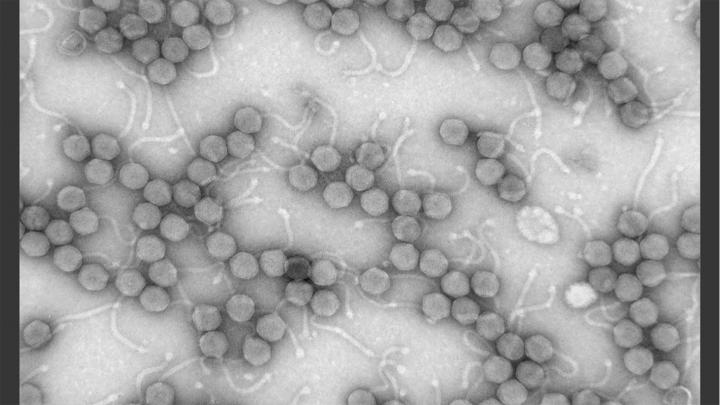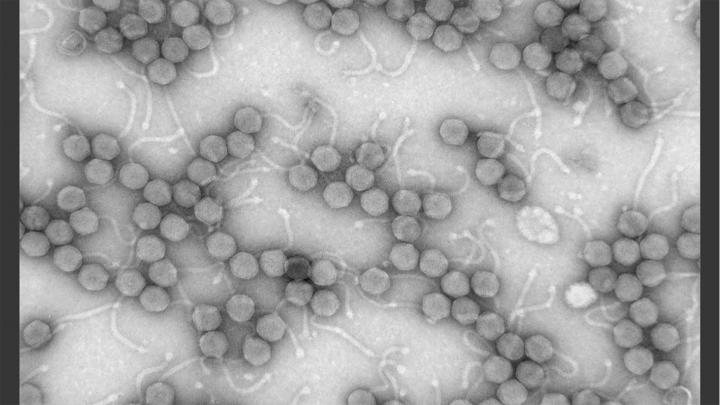
Credit: H. Hendricks, NC State Phage Hunters, E. Miller, NC State University.
Unexpected patterns emerged in the microbial and viral communities of mice with intestinal inflammation during a study that examined the intestinal tracts of diseased and healthy mice. Spearheaded by researchers at North Carolina State University, the University of Texas Southwestern Medical Center and the University of Colorado, the study could lead to better understanding of potential causes and markers of inflammatory bowel disease.
Studying the microbiome – the community of microorganisms inhabiting animals and plants – has become a major scientific focus in recent years, as researchers work to tease apart various interactions of microorganisms inside the gut in order to understand how they affect health.
While much of the focus of health-related microbiome studies is on bacteria, Manuel Kleiner, a NC State microbiologist, wanted to learn more about bacteriophages and their potential role in intestinal inflammation. Bacteriophages are viruses that infect and often kill bacteria. Bacteriophages vastly outnumber bacteria and thus have major effects on the trillions of bacteria living in the human intestinal tract.
Using new quantitative metagenomics techniques specifically developed to better study viruses in the intestinal tract, the team of researchers compared the phage communities in healthy mice and mice that had inflamed intestinal tracts.
"We wanted to see how virus and bacterial communities differ in disease and healthy conditions," Kleiner said.
In healthy mice, bacterial and phage communities remained rather stable and comparable over time, which the researchers predicted. Generally, changes in the number of of specific species of bacteria led to corresponding changes in the number of their viral predators.
Yet diseased mice showed unexpected results. The viral communities in diseased mice over time got more and more different not only from the healthy mice, which was expected, but also between diseased mice. The number of bacteriophages that were detectable in diseased mice dropped enormously, and the remaining few bacteriophages became very abundant. Several of these bacteriophages are known to infect disease-causing bacteria, which also increased in abundance. However, some of the bacteriophages that became more dominant during inflammation were not linked to any of the disease-causing bacteria.
"Diseased mice showed individual divergent – seemingly random – increases in the abundance of some bacteriophages that are not associated with disease-causing bacteria. We speculate that inflammation or other mouse defenses may impact these bacteriophages," Kleiner said.
Moreover, the researchers compared these patterns to existing data and literature on healthy and diseased human microbial communities. Interestingly, and surprisingly, many of the patterns seen in healthy and diseased mice respectively "overlap with healthy and diseased human viral communities," Kleiner said.
"This was unexpected, as mouse studies are frequently viewed as limited when looking for links to human health, but we could show that there are consistent patterns in the viral community in inflammation in both mice and humans," Kleiner said.
###
The study appears in Nature Microbiology. The study was supported by the National Institutes of Health (R01DK070855 and K01DK102436), the Howard Hughes Medical Institute, the Government of Canada's Banting Postdoctoral Fellowship and the NC State Chancellor's Faculty Excellence Program.
Paper co-authors included co-corresponding author Breck Duerkop from the University of Colorado; David Paez-Espino, Brian Bushnell and Nikos C. Kyrpides from the Department of Energy's Joint Genome Institute; and Wenhan Zhu, Sebastian E. Winter, Brian Hassell and co-corresponding author Lora V. Hooper from the University of Texas Southwestern Medical Center.
Note to editors: An abstract of the paper follows.
"Murine colitis reveals a disease-associated bacteriophage community"
Authors: Manuel Kleiner, North Carolina State University; Breck Duerkop, University of Colorado; David Paez-Espino, Brian Bushnell and Nikos C. Kyrpides, Department of Energy Joint Genome Institute; Wenhan Zhu, Sebastian E. Winter, Brian Hassell and Lora V. Hooper, University of Texas Southwestern Medical Center
Published: July 23, 2018 in Nature Microbiology
DOI: 10.1038/s41564-018-0210-y
Abstract: The dysregulation of intestinal microbial communities is associated with inflammatory bowel diseases (IBD). Studies aimed at understanding the contribution of the microbiota to inflammatory diseases have primarily focused on bacteria, yet the intestine harbours a viral component dominated by prokaryotic viruses known as bacteriophages (phages). Phage numbers are elevated at the intestinal mucosal surface and phages increase in abundance during IBD, suggesting that phages play an unidentified role in IBD. We used a sequence-independent approach for the selection of viral contigs and then applied quantitative metagenomics to study intestinal phages in a mouse model of colitis. We discovered that during colitis the intestinal phage population is altered and transitions from an ordered state to a stochastic dysbiosis. We identified phages specific to pathobiotic hosts associated with intestinal disease, whose abundances are significantly altered during colitis. Additionally, phage populations in healthy and diseased mice overlapped with phages from healthy humans and humans with IBD. Our findings indicate that intestinal phage communities are altered during inflammatory disease establishing a platform for investigating phage involvement in IBD.
Media Contact
Manuel Kleiner
[email protected]
919-515-3792
@NCStateNews
Original Source
https://news.ncsu.edu/2018/07/intestinal-virus-changes/ http://dx.doi.org/10.1038/s41564-018-0210-y





